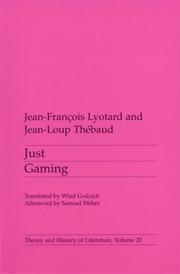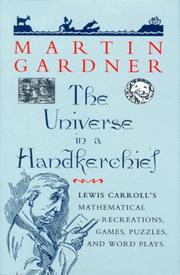| Listing 1 - 10 of 15 | << page >> |
Sort by
|
Book
ISBN: 9788073672027 8073672022 Year: 2007 Publisher: Praha : Portál,
Abstract | Keywords | Export | Availability | Bookmark
 Loading...
Loading...Choose an application
- Reference Manager
- EndNote
- RefWorks (Direct export to RefWorks)
Czech language. --- Jazykové hry. --- Language games. --- Čeština.
Book
Year: 2024 Publisher: Borgerhout Kras Jeugdwerk vzw
Abstract | Keywords | Export | Availability | Bookmark
 Loading...
Loading...Choose an application
- Reference Manager
- EndNote
- RefWorks (Direct export to RefWorks)
Didactic strategies --- Didactics of sports and games --- language games --- spellen

ISBN: 0816612811 0816612773 Year: 1999 Publisher: Minneapolis (Minn.) : University of Minnesota press,
Abstract | Keywords | Export | Availability | Bookmark
 Loading...
Loading...Choose an application
- Reference Manager
- EndNote
- RefWorks (Direct export to RefWorks)
Philosophical recreations --- Literary recreations --- Language games --- Recreations, Literary --- Amusements --- Recreations, Philosophical --- Games --- Literary recreations. --- Philosophical recreations.
Book
Year: 2015 Publisher: Language Science Press
Abstract | Keywords | Export | Availability | Bookmark
 Loading...
Loading...Choose an application
- Reference Manager
- EndNote
- RefWorks (Direct export to RefWorks)
The Talking Heads Experiment, conducted in the years 1999-2001, was the first large-scale experiment in which open populations of situated embodied agents created for the first time ever a new shared vocabulary by playing language games about real world scenes in front of them. The agents could teleport to different physical sites in the world through the Internet. Sites, in Antwerp, Brussels, Paris, Tokyo, London, Cambridge and several other locations were linked into the network. Humans could interact with the robotic agents either on site or remotely through the Internet and thus influence the evolving ontologies and languages of the artificial agents. The present book describes in detail the motivation, the cognitive mechanisms used by the agents, the various installations of the Talking Heads, the experimental results that were obtained, and the interaction with humans. It also provides a perspective on what happened in the field after these initial groundbreaking experiments. The book is invaluable reading for anyone interested in the history of agent-based models of language evolution and the future of Artificial Intelligence.
Information technology. --- Information society. --- shared vocabulary --- situated embodied agents --- agent-based models --- future of artificial intelligence --- human-robotic interaction --- language in robotics --- language evolution --- language games --- Lexicon --- Paris --- Semiotics --- Syntax --- shared vocabulary --- situated embodied agents --- agent-based models --- future of artificial intelligence --- human-robotic interaction --- language in robotics --- language evolution --- language games --- Lexicon --- Paris --- Semiotics --- Syntax

ISBN: 019282516X Year: 1996 Publisher: Oxford Oxford University Press
Abstract | Keywords | Export | Availability | Bookmark
 Loading...
Loading...Choose an application
- Reference Manager
- EndNote
- RefWorks (Direct export to RefWorks)
Fiction --- English literature --- English fiction --- -Literary recreations --- Puzzles --- -English literature --- Amusements --- Games --- Riddles --- Language games --- Recreations, Literary --- Miscellanea --- History and criticism --- Literary recreations. --- Puzzles. --- History and criticism. --- Miscellanea. --- -Miscellanea --- Literary recreations

ISBN: 038794673X Year: 1996 Publisher: New York Copernicus
Abstract | Keywords | Export | Availability | Bookmark
 Loading...
Loading...Choose an application
- Reference Manager
- EndNote
- RefWorks (Direct export to RefWorks)
Jeux et récréations littéraires --- Jeux et récréations mathématiques --- Language games --- Literaire spelletjes --- Literary recreations --- Mathematical recreations --- Recreations [Literary ] --- Taalspelletjes --- Wiskundige spelletjes --- Jeux littéraires --- Jeux mathématiques --- Jeux littéraires --- Jeux mathématiques
Book
ISBN: 1787444791 1843845261 Year: 2019 Publisher: Cambridge : D. S. Brewer,
Abstract | Keywords | Export | Availability | Bookmark
 Loading...
Loading...Choose an application
- Reference Manager
- EndNote
- RefWorks (Direct export to RefWorks)
An invigorating annual for those who are interested in medieval textual cultures and open to ways in which diverse post-modern methodologies may be applied to them. "Alcuin Blamires Review of English Studies"
Literature, Medieval --- History and criticism. --- Anglo-French poetry. --- British Isles. --- Cultural plurality. --- Ecclesiastical history. --- Europe. --- Intellectual diversity. --- Italian song. --- Language games. --- Literary analysis. --- Medieval literary studies. --- Medieval textual cultures. --- Old Norse sagas. --- Textual practices.
Book
Year: 2015 Publisher: Language Science Press
Abstract | Keywords | Export | Availability | Bookmark
 Loading...
Loading...Choose an application
- Reference Manager
- EndNote
- RefWorks (Direct export to RefWorks)
The Talking Heads Experiment, conducted in the years 1999-2001, was the first large-scale experiment in which open populations of situated embodied agents created for the first time ever a new shared vocabulary by playing language games about real world scenes in front of them. The agents could teleport to different physical sites in the world through the Internet. Sites, in Antwerp, Brussels, Paris, Tokyo, London, Cambridge and several other locations were linked into the network. Humans could interact with the robotic agents either on site or remotely through the Internet and thus influence the evolving ontologies and languages of the artificial agents. The present book describes in detail the motivation, the cognitive mechanisms used by the agents, the various installations of the Talking Heads, the experimental results that were obtained, and the interaction with humans. It also provides a perspective on what happened in the field after these initial groundbreaking experiments. The book is invaluable reading for anyone interested in the history of agent-based models of language evolution and the future of Artificial Intelligence.
Information technology. --- Information society. --- shared vocabulary --- situated embodied agents --- agent-based models --- future of artificial intelligence --- human-robotic interaction --- language in robotics --- language evolution --- language games --- Lexicon --- Paris --- Semiotics --- Syntax
Book
Year: 2015 Publisher: Language Science Press
Abstract | Keywords | Export | Availability | Bookmark
 Loading...
Loading...Choose an application
- Reference Manager
- EndNote
- RefWorks (Direct export to RefWorks)
The Talking Heads Experiment, conducted in the years 1999-2001, was the first large-scale experiment in which open populations of situated embodied agents created for the first time ever a new shared vocabulary by playing language games about real world scenes in front of them. The agents could teleport to different physical sites in the world through the Internet. Sites, in Antwerp, Brussels, Paris, Tokyo, London, Cambridge and several other locations were linked into the network. Humans could interact with the robotic agents either on site or remotely through the Internet and thus influence the evolving ontologies and languages of the artificial agents. The present book describes in detail the motivation, the cognitive mechanisms used by the agents, the various installations of the Talking Heads, the experimental results that were obtained, and the interaction with humans. It also provides a perspective on what happened in the field after these initial groundbreaking experiments. The book is invaluable reading for anyone interested in the history of agent-based models of language evolution and the future of Artificial Intelligence.
Information technology. --- Information society. --- shared vocabulary --- situated embodied agents --- agent-based models --- future of artificial intelligence --- human-robotic interaction --- language in robotics --- language evolution --- language games --- Lexicon --- Paris --- Semiotics --- Syntax

ISBN: 019283309X 9780192833099 Year: 1997 Publisher: Oxford Oxford University Press
Abstract | Keywords | Export | Availability | Bookmark
 Loading...
Loading...Choose an application
- Reference Manager
- EndNote
- RefWorks (Direct export to RefWorks)
The sequel to "Is Heathcliff A Murderer?", this is another collection of literary puzzles turning up unexpected and brain-teasing aspects of the range of canonical British and American fiction in the Oxford World's Classics list. Puzzles include: why does Robinson Crusoe find only one footprint?
Fiction --- English literature --- anno 1800-1999 --- American fiction --- English fiction --- Literary recreations. --- Puzzles. --- Miscellanea. --- History and criticism. --- Literary recreations --- Puzzles --- Amusements --- Games --- Riddles --- Language games --- Recreations, Literary --- American literature --- Miscellanea --- History and criticism --- English-speaking countries --- Anglophone countries --- Countries, Anglophone --- Countries, English-speaking --- Intellectual life
| Listing 1 - 10 of 15 | << page >> |
Sort by
|

 Search
Search Feedback
Feedback About UniCat
About UniCat  Help
Help News
News